Voces8 LIVE from London online review part 2 – an assortment box of Christmas choral treats | reviews, news & interviews
Voces8 LIVE from London online review part 2 – an assortment box of Christmas choral treats
Voces8 LIVE from London online review part 2 – an assortment box of Christmas choral treats
The second half of this ambitious festival provides further multifarious pleasures
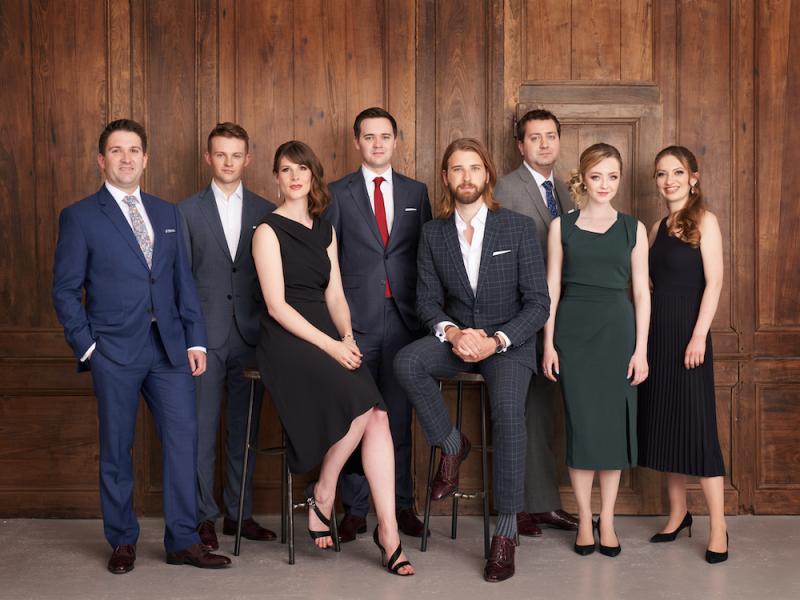
I gave a rare five stars to the first half of the Voces8 LIVE From London Christmas online festival and the second five concerts matched the first in their vitality, virtuosity and variety.
As before the concerts proper were filled out with pre-show interviews, Young Artist Spotlights and the relaxed chats of the after-show “Artists’ Lounge”. The hosts throughout were Paul and Barnaby Smith, the creative heart of the Voces8 Foundation, who also appeared as composer and singer respectively within the festival. The interviews provided a number of interesting insights, both on musical aspects of the various groups’ aesthetics, but also on the practicalities of concert-giving and how they have been affected by Covid.
The guest groups for the second half of the festival were again of an excellent quality, and with an international outlook, embracing the choir of Westminster Abbey, the German a cappella group amarcord, the Irish ensemble Anúna, the wonderful I Fagiolini (pictured below by Matthew Brodie), as well as a third appearance in the festival by Voces8 themselves. Each brought their own approach to the Christmas concert, from a straight-up carol service to, in the case of I Fagiolini, a combination as unlikely as the idea of adding salt to caramel, and similarly delicious.
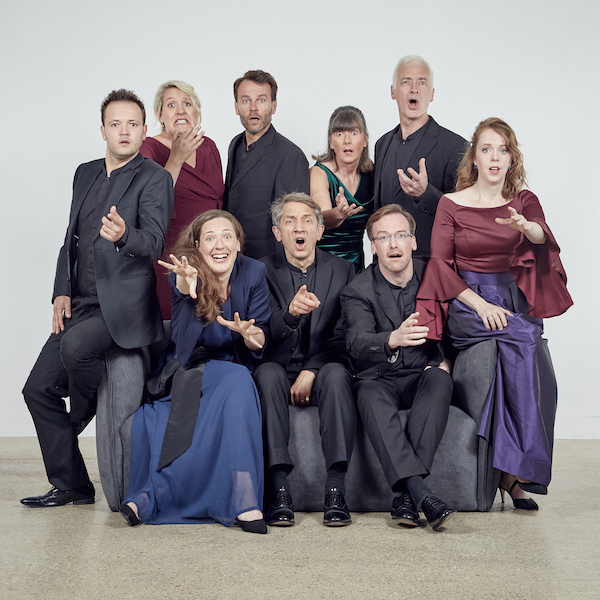 This was the last concert, on Christmas Eve, that recreated Midnight Mass by improbably intermingling Charpentier’s Messe de Minuit with Four Carol-Anthems by Herbert Howells and readings from Dylan Thomas’s A Child’s Christmas in Wales. It oughtn’t to have worked but it did, even down to I Fagiolini conductor Robert Hollingworth reading the Thomas in a very passable Welsh accent and a less passable brown dressing-gown.
This was the last concert, on Christmas Eve, that recreated Midnight Mass by improbably intermingling Charpentier’s Messe de Minuit with Four Carol-Anthems by Herbert Howells and readings from Dylan Thomas’s A Child’s Christmas in Wales. It oughtn’t to have worked but it did, even down to I Fagiolini conductor Robert Hollingworth reading the Thomas in a very passable Welsh accent and a less passable brown dressing-gown.
I didn’t know the Charpentier – in fact, Charpentier is largely a yet-to-be-opened book for me – but the music made a persuasive case. A contemporary of Purcell, he was eclipsed among French at the time, and subsequently, by Lully. But there is a earthy liveliness which is very enjoyable. The soprano lines are largely constructed from popular French carols of the day (although unknown today) and they danced and gleamed. Robert Hollingworth’s explained pre-show interview that choral blend comes from what the singers do, not what they refrain from doing, and here they made great (but subtle) use of French pronunciation of the Latin texts.
There was also pleasure in hearing, for the only time in the festival, instrumental accompaniment (apart from the occasional organ or harp elsewhere). Using period instruments, including bass violin (like an outsized cello, bowed like a viol) and two theorbos, one with tinsel up its immense neck, the playing had the learned attention to detail you would expect from Hollingworth, but without feeling at all academic. He conducted with characteristic wit and spontaneity. In fact, it was interesting, given most of the other groups were unconducted, to ask while watching: “Is the conductor adding anything?” I think Hollingworth does, but it is a very humble something. As he says: “All the real work is done in rehearsal.”
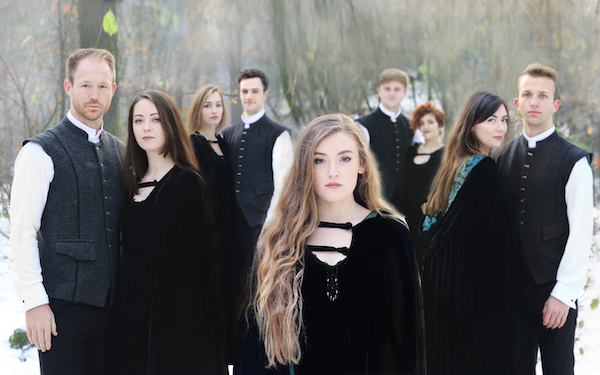 The Howells ranged from the well-known A Spotless Rose (with a gorgeously sung baritone solo) to the largely overlooked Long, long ago. The sound is modal and very English, and the singers switched on a sixpence from the operatic extroversion of the Charpentier to the more inward Howells. The finale had the start of First Snow by Bo Holten – a favourite composer of mine – overlapping with the end of the last reading, descending wordless scales from the upper parts joined by a low chorale. The chromatic lower lines against the diatonic scales above made for lovely scrunches and warm consonances.
The Howells ranged from the well-known A Spotless Rose (with a gorgeously sung baritone solo) to the largely overlooked Long, long ago. The sound is modal and very English, and the singers switched on a sixpence from the operatic extroversion of the Charpentier to the more inward Howells. The finale had the start of First Snow by Bo Holten – a favourite composer of mine – overlapping with the end of the last reading, descending wordless scales from the upper parts joined by a low chorale. The chromatic lower lines against the diatonic scales above made for lovely scrunches and warm consonances.
The second most interesting concert was that by Anúna (pictured above by Michael McGlynn), who bill themselves as “Ireland’s National Choir”, although their artistic director Michael McGlynn is chary of the word “choir” altogether, preferring the word “band”. His background was in rock and pop, and Anúna, which he formed in the 1980s as a “punk choir”, makes a point of intersection between traditional Irish and contemporary classical music.
McGlynn writes or arranges all the group’s music, which engages with the sean nos style of Ireland, which has no indigenous choral tradition, only solo singing. McGlynn’s compromise is that each piece has a foregrounded soloist, with the other singers creating complex webs of accompaniment, which range from some that approach easy listening, to others with quite dissonant and enticing effects.
Of singing without a conductor McGlynn (pictured below by Nejc Rudel) says “Everything looks completely effortless, because we’ve spent a lot of time learning how not to make so much effort”. The singers include McGlynn himself, as well as his wife and two daughters, Aisling and Lauren, both of whom took solos sung with self-possession, flawless tuning and a twinkle in the eye. The programme was beautifully paced, so the gentle “aural bath” of, for example, An Oíche, was balanced with the rhythmic charge of the Spanish medieval carol Ríu Ríu.
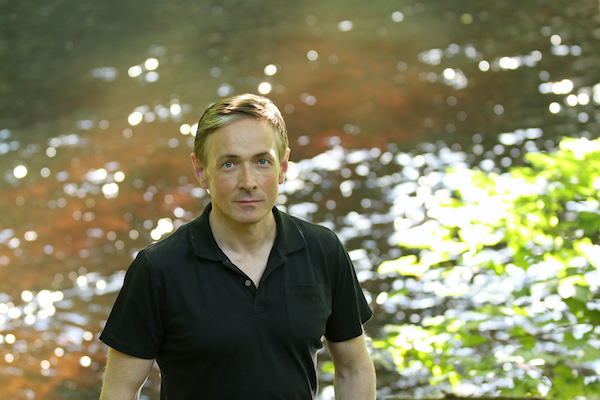 The music had something of the quality of the “holy minimalists” of the 1990s, but with a sharp enough bite, and a distinctive sensibility. The Wexford Carol was crunchy and flavoursome, plenty of false relations within the modal soundworld, and was balanced with a gutsy Gaudete and tongue-twisting Dúlamán.
The music had something of the quality of the “holy minimalists” of the 1990s, but with a sharp enough bite, and a distinctive sensibility. The Wexford Carol was crunchy and flavoursome, plenty of false relations within the modal soundworld, and was balanced with a gutsy Gaudete and tongue-twisting Dúlamán.
The film of the performance was the most ambitious of the festival, made by McGlynn himself despite his lack of experience as a film-maker. It combined footage of the performance in a Dublin church with images of stained glass and candles, the wild Irish coast and countryside. Although the lingering cross-dissolves were sometimes a bit perfume-advert-y it was nonetheless quite an achievement for a debutant film-maker.
And despite the occasional cloying, New Agey moment – Away in a Manger grinds my gears at the best of times – there was also so much to enjoy, such as the wordless Amhrán na gaoithe (Song of the Wind), which spoke of a composer/arranger who has created in Anúna the ideal means to say what he wants to say.
By comparison, the other events – though high-quality – were more run-of-the-mill. Christmas at Westminster Abbey was a straightforward cathedral service of lessons and carols (lessons read by the compelling Catherine Bott). It ranged from choral items (Warlock, Britten and Rutter) to congregational carols, sans congregation of course. The boy choristers sang with commitment, James O’Donnell was a genial concertmaster, everything was extremely tasteful but, dare I say it, entirely predictable. In the words of Radiohead, “No alarms and no surprises.”
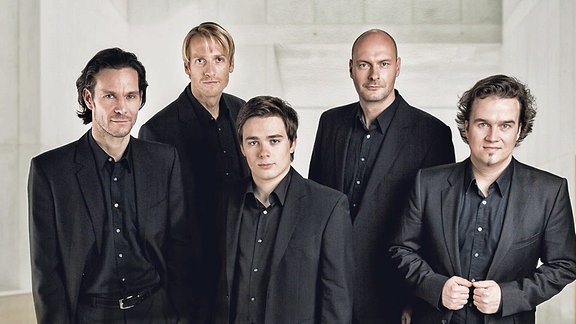 Something similar could be said for Christmas from Germany, courtesy of the male voice quintet Amarcord from Leipzig (pictured above). Here at least the traditional Christmas they mined is less familiar, apart from Stille Nacht with which they finished, in a pleasingly astringent arrangement. They offered bucketloads of Gemütlichkeit, some lovely insights into German choral tradition, and a timely connection with Europe.
Something similar could be said for Christmas from Germany, courtesy of the male voice quintet Amarcord from Leipzig (pictured above). Here at least the traditional Christmas they mined is less familiar, apart from Stille Nacht with which they finished, in a pleasingly astringent arrangement. They offered bucketloads of Gemütlichkeit, some lovely insights into German choral tradition, and a timely connection with Europe.
Which leaves just the final Voces8 outing on 23 December. This ticked the Christmas boxes – annunciation, nativity etc – but through unusual repertoire choices. There was a big chunk of Praetorius in the middle, a proper workout for the singers, and some vigorous Scheidt, bouncing alleluias passed around the choir. The highlight was perhaps Britten’s setting of the distinctly peculiar Corpus Christi Carol, capturing its otherworldly strangeness but in familiar language, his most notable skill.
The festival concerts are still available online, either as a whole season or individual events, and I would recommend seeking them out. For me, they have been a much-needed and cheering end to a year which has seen choral singing all but cancelled. Bravo to Voces8 for raging against the dying of the light.
rating
Explore topics
Share this article
The future of Arts Journalism
You can stop theartsdesk.com closing!
We urgently need financing to survive. Our fundraising drive has thus far raised £49,000 but we need to reach £100,000 or we will be forced to close. Please contribute here: https://gofund.me/c3f6033d
And if you can forward this information to anyone who might assist, we’d be grateful.

Subscribe to theartsdesk.com
Thank you for continuing to read our work on theartsdesk.com. For unlimited access to every article in its entirety, including our archive of more than 15,000 pieces, we're asking for £5 per month or £40 per year. We feel it's a very good deal, and hope you do too.
To take a subscription now simply click here.
And if you're looking for that extra gift for a friend or family member, why not treat them to a theartsdesk.com gift subscription?
more Classical music
 Shibe, LSO, Adès, Barbican review - gaudy and glorious new music alongside serene Sibelius
Adès’s passion makes persuasive case for the music he loves, both new and old
Shibe, LSO, Adès, Barbican review - gaudy and glorious new music alongside serene Sibelius
Adès’s passion makes persuasive case for the music he loves, both new and old
 Anja Mittermüller, Richard Fu, Wigmore Hall review - a glorious hall debut
The Austrian mezzo shines - at the age of 22
Anja Mittermüller, Richard Fu, Wigmore Hall review - a glorious hall debut
The Austrian mezzo shines - at the age of 22
 First Person: clarinettist Oliver Pashley on the new horizons of The Hermes Experiment's latest album
Compositions by members of this unusual quartet feature for the first time
First Person: clarinettist Oliver Pashley on the new horizons of The Hermes Experiment's latest album
Compositions by members of this unusual quartet feature for the first time
 Gesualdo Passione, Les Arts Florissants, Amala Dior Company, Barbican review - inspired collaboration excavates the music's humanity
At times it was like watching an anarchic religious procession
Gesualdo Passione, Les Arts Florissants, Amala Dior Company, Barbican review - inspired collaboration excavates the music's humanity
At times it was like watching an anarchic religious procession
 Classical CDs: Camels, concrete and cabaret
An influential American composer's 90th birthday box, plus British piano concertos and a father-and-son duo
Classical CDs: Camels, concrete and cabaret
An influential American composer's 90th birthday box, plus British piano concertos and a father-and-son duo
 Cockerham, Manchester Camerata, Sheen, Martin Harris Centre, Manchester review - re-enacting the dawn of modernism
Two UK premieres added to three miniatures from a seminal event of January 1914
Cockerham, Manchester Camerata, Sheen, Martin Harris Centre, Manchester review - re-enacting the dawn of modernism
Two UK premieres added to three miniatures from a seminal event of January 1914
 Kempf, Brno Philharmonic, Davies, Bridgewater Hall, Manchester review - European tradition meets American jazz
Bouncing Czechs enjoy their Gershwin and Brubeck alongside Janáček and Dvořák
Kempf, Brno Philharmonic, Davies, Bridgewater Hall, Manchester review - European tradition meets American jazz
Bouncing Czechs enjoy their Gershwin and Brubeck alongside Janáček and Dvořák
 Solomon, OAE, Butt, QEH review - daft Biblical whitewashing with great choruses
Even a top soprano and mezzo can’t make this Handel paean wholly convincing
Solomon, OAE, Butt, QEH review - daft Biblical whitewashing with great choruses
Even a top soprano and mezzo can’t make this Handel paean wholly convincing
 Two-Piano Gala, Kings Place review - shining constellations
London Piano Festival curators and illustrious friends entertain and enlighten
Two-Piano Gala, Kings Place review - shining constellations
London Piano Festival curators and illustrious friends entertain and enlighten
 Echo Vocal Ensemble, Latto, Union Chapel review - eclectic choral programme garlanded with dance
Beautiful singing at the heart of an imaginative and stylistically varied concert
Echo Vocal Ensemble, Latto, Union Chapel review - eclectic choral programme garlanded with dance
Beautiful singing at the heart of an imaginative and stylistically varied concert
 Scott, Irish Baroque Orchestra, Whelan, RIAM, Dublin review - towards a Mozart masterpiece
Characteristic joy and enlightenment from this team, but a valveless horn brings problems
Scott, Irish Baroque Orchestra, Whelan, RIAM, Dublin review - towards a Mozart masterpiece
Characteristic joy and enlightenment from this team, but a valveless horn brings problems

Add comment